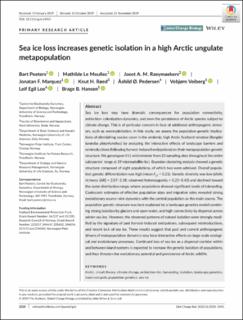| dc.contributor.author | Peeters, Bart | |
| dc.contributor.author | Le Moullec, Mathilde | |
| dc.contributor.author | Raeymaekers, Joost A.M. | |
| dc.contributor.author | Fredricson Marquez, Jonatan | |
| dc.contributor.author | Røed, Knut | |
| dc.contributor.author | Pedersen, Åshild Ønvik | |
| dc.contributor.author | Veiberg, Vebjørn | |
| dc.contributor.author | Loe, Leif Egil | |
| dc.contributor.author | Hansen, Brage Bremset | |
| dc.date.accessioned | 2020-05-28T06:32:45Z | |
| dc.date.available | 2020-05-28T06:32:45Z | |
| dc.date.created | 2020-01-07T14:26:49Z | |
| dc.date.issued | 2019 | |
| dc.identifier.citation | Peeters, B., Le Moullec, M., Raeymaekers, J.A.M., Fredricson Marquez, J., Røed, K., Pedersen, Å.Ø., Veiberg, V., Loe, L.E. & Hansen, B.B. (2020). Sea ice loss increases genetic isolation in a high Arctic ungulate metapopulation. Global Change Biology, 26(4), 2028-2041. doi: | en_US |
| dc.identifier.issn | 1365-2486 | |
| dc.identifier.uri | https://hdl.handle.net/11250/2655842 | |
| dc.description.abstract | Sea ice loss may have dramatic consequences for population connectivity, extinction–colonization dynamics, and even the persistence of Arctic species subject to climate change. This is of particular concern in face of additional anthropogenic stressors, such as overexploitation. In this study, we assess the population‐genetic implications of diminishing sea ice cover in the endemic, high Arctic Svalbard reindeer (Rangifer tarandus platyrhynchus) by analyzing the interactive effects of landscape barriers and reintroductions (following harvest‐induced extirpations) on their metapopulation genetic structure. We genotyped 411 wild reindeer from 25 sampling sites throughout the entire subspecies' range at 19 microsatellite loci. Bayesian clustering analysis showed a genetic structure composed of eight populations, of which two were admixed. Overall population genetic differentiation was high (mean FST = 0.21). Genetic diversity was low (allelic richness [AR] = 2.07–2.58; observed heterozygosity = 0.23–0.43) and declined toward the outer distribution range, where populations showed significant levels of inbreeding. Coalescent estimates of effective population sizes and migration rates revealed strong evolutionary source–sink dynamics with the central population as the main source. The population genetic structure was best explained by a landscape genetics model combining strong isolation by glaciers and open water, and high connectivity by dispersal across winter sea ice. However, the observed patterns of natural isolation were strongly modified by the signature of past harvest‐induced extirpations, subsequent reintroductions, and recent lack of sea ice. These results suggest that past and current anthropogenic drivers of metapopulation dynamics may have interactive effects on large‐scale ecological and evolutionary processes. Continued loss of sea ice as a dispersal corridor within and between island systems is expected to increase the genetic isolation of populations, and thus threaten the evolutionary potential and persistence of Arctic wildlife. | en_US |
| dc.language.iso | eng | en_US |
| dc.publisher | Wiley | en_US |
| dc.rights | Navngivelse-Ikkekommersiell 4.0 Internasjonal | * |
| dc.rights.uri | http://creativecommons.org/licenses/by-nc/4.0/deed.no | * |
| dc.title | Sea ice loss increases genetic isolation in a high Arctic ungulate metapopulation | en_US |
| dc.type | Peer reviewed | en_US |
| dc.type | Journal article | en_US |
| dc.description.version | publishedVersion | en_US |
| dc.rights.holder | © 2019 The Author(s) | en_US |
| dc.subject.nsi | VDP::Matematikk og Naturvitenskap: 400::Basale biofag: 470::Genetikk og genomikk: 474 | en_US |
| dc.subject.nsi | VDP::Matematikk og Naturvitenskap: 400::Geofag: 450 | en_US |
| dc.source.pagenumber | 2028-2041 | en_US |
| dc.source.volume | 26 | en_US |
| dc.source.journal | Global Change Biology | en_US |
| dc.source.issue | 4 | en_US |
| dc.identifier.doi | 10.1111/gcb.14965 | |
| dc.identifier.cristin | 1767809 | |
| dc.relation.project | Research Council of Norway: 246054 | en_US |
| dc.relation.project | Research Council of Norway: 244647 | en_US |
| dc.relation.project | Research Council of Norway: 257173 | en_US |
| dc.relation.project | Research Council of Norway: 235652 | en_US |
| dc.relation.project | Research Council of Norway: 223257 | en_US |
| dc.relation.project | Research Council of Norway: 276080 | en_US |
| dc.relation.project | Svalbard Environmental Protection Fund: 14/137 | en_US |
| dc.relation.project | Svalbard Environmental Protection Fund: 15/105 | en_US |
| dc.description.localcode | Paid Open Access | en_US |
| dc.description.localcode | | |

